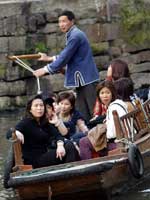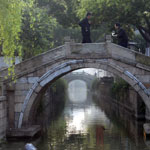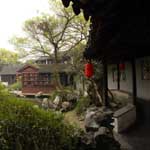|
Tongli: A place for meditation
By Xiao Chao (China Daily)
Updated: 2004-04-26 09:59
TONGLI, Jiangsu:Spring is the time for outings.
 But in North China, spring passes by much too quickly. Before people make their plans and pack their bags, it is already gone. Many of the spring clothes this year have remained in the closet and people have already switched over to summer T-shirts and have the air-conditioning on. But in North China, spring passes by much too quickly. Before people make their plans and pack their bags, it is already gone. Many of the spring clothes this year have remained in the closet and people have already switched over to summer T-shirts and have the air-conditioning on.
But for those who still want to show off their new spring clothes and enjoy the warm sunshine, cool breeze and refreshing drizzle, fortunately, there is another option - taking a trip to the South.
In East China, especially Jiangnan - the southern areas of the lower reaches of the Yangtze River, spring is still there. And it is the best season to drink green tea, to taste fresh bamboo roots, and to visit towns along the water.
There are quite a few ancient riverside towns in Jiangnan, especially in the south of Jiangsu Province and the north of Zhejiang Province. Tongli Town in Wujiang City, Jiangsu Province, particularly stands out as one of the best-preserved. It warrants a closer look as it is more quiet and not as crowded as other neighbouring towns, such as Zhouzhuang.
Town on the water
 About 80 kilometres west of Shanghai and 18 kilometres from Suzhou to the north, Tongli rests on the eastern shore of an ancient canal, and Lake Taihu. About 80 kilometres west of Shanghai and 18 kilometres from Suzhou to the north, Tongli rests on the eastern shore of an ancient canal, and Lake Taihu.
Settled among the five lakes of Tongli, Jiuli, Yeze, Nanxing and Pangshan, the town is divided into seven islands by 15 rivers.
Intersected by so many canals, it is like a town floating on the water.
Because of the landscape, almost all of the buildings in the town are along the waterfront. In front of the buildings, small stairs leading to the canals were built, which are convenient for local residents to wash clothes in and move around the town by boat.
Because of the water, reflections of arched roofs, lofty gables, stone bridges and green willows lining the banks can be found almost everywhere in the town. It helps create a poetic atmosphere.
Tongli is truly a town of bridges in various styles.
There are 49 stone bridges linking different sections of the town, and each bridge has a name and often displays a different style.
Probably the most notable are Taiping (Peace and Tranquility) Bridge, Jili (Luck) Bridge and Changqing (Lasting Celebration) Bridge.
They are known as Ternate Bridges, as they cross three rivers at their confluence and form a natural ring road.
 Small and exquisite Taiping Bridge was built during the reign of emperor Jiaqing of the Qing Dynasty (1644-1911). Jili Bridge is an arch bridge, inscribed with age-old couplets describing the beautiful scenery at either end. The Changqing Bridge, also named Guangli Bridge, was originally built in 1470 and rebuilt in 1704. Small and exquisite Taiping Bridge was built during the reign of emperor Jiaqing of the Qing Dynasty (1644-1911). Jili Bridge is an arch bridge, inscribed with age-old couplets describing the beautiful scenery at either end. The Changqing Bridge, also named Guangli Bridge, was originally built in 1470 and rebuilt in 1704.
The Ternate Bridges are propitious symbols in the eyes of the local residents and they walk over them for good luck during weddings or birthday parties.
The oldest bridge in Tongli is Siben (Reflecting Origin) Bridge, which was built in the Song Dynasty (960-1279), while the smallest bridge is called Dubu (Single Step) Bridge and is only one-and-a-half metres in length and less than one metre in width.
Standing motionless for hundreds of years, the bridges have witnessed the rise and fall of the town and provided various angles for visitors to have a closer look at the town.
Old houses and gardens
Originally named Fushi, Tongli has a history of more than 1,000 years. Thanks to the lakes and waterways, it stayed away from wars which swallowed many other beautiful towns in ancient times. Its former glory can be found in many well-preserved ancient residential and monastic buildings.
In fact, the town is known as a "museum of ancient Chinese architecture," as about 40 per cent of the houses and temples in the town date back to the Ming (1368-1644) and Qing dynasties.
With their whitewashed walls, black tiled roofs, eaves, carved wooden windows and elegant wood structures, ancient buildings are dominant in the old town.
Owing to the charming environment, in ancient times many noblemen and distinguished families also built their private gardens there.
These complexes of buildings, featuring the harmonious combination of residential buildings and gardens, are unique, rare even among other waterfront towns south of the Yangtze River.
From 1271 to 1911, 38 mansions and gardens were built in the town one after another, many of which have been well preserved till now.
Among them, Tuisi (Retreat and Meditation) Garden has been the most famous, especially after it was put onto the list of World Cultural Heritage Sites of the United Nations Educational, Scientific and Cultural Organization in 2000.
This garden was built by Ren Lansheng in 1886 during the Qing Dynasty, after he was discharged from office.
"When in office, one should be loyal to the emperor, when away from office, one should meditate upon his previous faults." This was the motto of Chinese officials in imperial times and where the garden's name "Retreat and Meditation" came from.
The western part of the garden is the residential quarter, including a sitting hall, a tea hall and the main hall. The eastern part is the scenic area consists of the exterior and interior gardens, stretching from west to east.
In the north of the exterior garden are halls for meeting or entertaining guests. On the other side is a boat landing dock, serving as a rendezvous point for guests.
In the interior garden, the pavilions, terraces, winding causeways, corridors and rockeries all surround ponds, giving people the illusion of floating on the water. Therefore the garden is also known as Tieshui Yuan (Garden Close to the Water).
Covering an area of 6,600 square metres, the garden is shaded by lush elegant trees and embroidered with various bonsais and flowers. Red carp swim in the ponds, and various birds chirp in the woods. One can feel a classical elegance and harmony.
Built in 1922, Jiayin Hall is another well-designed private mansion in the town.
There visitors can appreciate exquisite wood carvings on beams, columns and windows of the buildings. Pieced carvings or relief sculptures, they are traditional patterns or figures from Chinese literature classics and worth a closer look.
In fact, a trip to Tongli can be a trip of discoveries, as one can find excellent wood carvings, brick carvings, or distinctive wood windows at the most unexpected time and place.
Sizzling life
But Tongli is more than just a town with old bridges, houses and gardens.
As it is still a less popular destination in the region, it is bubbling and sizzling with life.
There one can still stroll around the town along its stone-paved lane, seeing women washing clothes by the canals, elderly ladies doing morning exercise in groups, men playing cards in teahouses, and fishermen paddling through the waterways with their solemn cormorants standing on the boats.
Spending little money, one can enjoy the local specialities: smoked fish and steamed meat buns. At the Nanyuan Teahouse, one can drink the fresh green tea served in clay pots.
Though one day is quite enough for travellers to visit all of the scenic spots in town, two days are certainly better as one can check into a privately owned guesthouse, which is usually in traditional old buildings and savour the peaceful atmosphere of the town at ease.
And for something different...
The China Ancient Sex Museum, once located in the booming streets of Shanghai and relocated due to a funding shortage, reopened in Tongli Town yesterday. So people might be able to find something exotic in Tongli soon.
But it might also mean more tourists, as news of the museum spread across the country this week.
So hurry up! You've got too many reasons to make the trip south.
|
